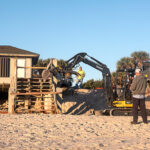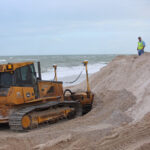Updated – 8:50 p.m.
INDIAN RIVER COUNTY – The Board of Indian River County Commissioners unanimously denied a construction demolition debris and recycling center that had been proposed for a nine-acre site on Oslo Road near 66th Avenue.
The 5-0 vote came after nearly seven hours of testimony from county staff, the applicant and a representative of the nearly 3,000 homeowners in the surrounding south county area.
The crowd erupted in cheers, applause and whistles when the vote was announced.
Vero Beach attorney Barry Segal said after the vote that he would speak with his client, the owners of the proposed A-1 Walee facility to determine how to proceed.
“It’s always a possibility,” Segal said of appealing the commission’s decision.
Commissioners cited concerns about the compatibility of the facility with the agricultural nature of the land around it as well as issues pertaining to the public’s health, safety and welfare.
Commissioner Wesley Davis, who opposed the facility’s location, suggested the board consider in the future pursuing such a construction demolition debris and recycling center at the county’s landfill.
“There’s a lot about this we don’t know,” said Brian Carman, executive director of the Indian River Neighborhood Association, adding that they wouldn’t know until after the facility were built and in operation – and by then the “toothpaste is out of the tube.”
“The risk is too great,” he told commissioners.
Carman was one of a few residents who took the opportunity to directly address the Board of County Commissioners.
At the start of the discussion, more than 100 residents stood to be sworn in to be allowed to speak on the issue.
However, as the day wore on and time became short, all but a few residents withdrew their requests to speak in the interest of giving commissioners enough time to deliberate and make a decision without having to postpone the meeting to a later date.
The Board of County Commissioners, prior to the A-1 Walee facility being placed on the agenda, agreed to allow the School Board use of the Commission Chambers for its business meeting and had to adjourn by 5:15 p.m. to give School District staff time to prepare for the meeting.
“I would hate, personally, to rush,” Commission Chair Bob Solari told his fellow commissioners as he proposed they continue the meeting to a later date to allow ample time for the discussion.
Other commissioners, however, pushed to move forward and see if they couldn’t come to a decision by 5:15 p.m.
“It has been my position that there’s been a lot of shock and awe to scare people,” Segal told commissioners, referring to the testimony presented by the opposition.
The opposition’s representative, attorney Keith Poliakoff of Ft. Lauderdale, brought forward various people to speak to the dangers such construction demolition debris facilities – and wood mulching centers – can pose to the public’s health.
The opposition showed commissioners a news piece that a TV station in the area ran on arsenic levels found in mulch that had been created from chipping the wood recovered from demolition sites. Some wood recovered from such sites had been pressure-treated with certain chemicals known to cause illness.
The applicant’s team argued that A-1 Walee would not be allowed to accept that type of material under law. However, questions were raised about how facility workers would be able to identify treated wood mixed with a mess of other demolition materials.
“I believe there will be an adverse impact on the public’s health, safety and welfare,” Commissioner Joe Flescher said after recommending to fellow commissioners to deny the application.
He added that he had not heard any testimony from the applicant’s side to suggest that there would be adequate protection for the public or that there would be the proper amount of scrutiny of the site and its operations.
Commissioner Gary Wheeler said that the safety and health issues could be debated but “I can certainly hang a hat on compatibility.”
He said that the people who have moved into the area were there first and added that he believes their property values could be diminished if the facility were built.






